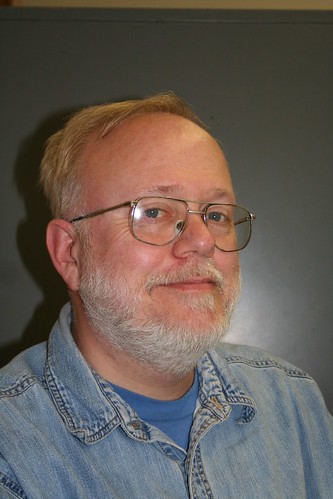I've been following the (discouragingly few) developments in the situation of the Christian Peacemaker Team members who were abudcted in Iraq by looking every day at the relevant portion of the
Quaker Blog Watch There is a link there right now that troubles me in a different way than I expected.
The link says
If the State Took our Brothers, Then
We Must be Having a Powerful Effect. Clicking this link brings one to a blog called "Cytations" whose ownership and point of view I can't quite place. I at first took it to be something sponsored by the Christian Peacemaker Teams, but I have started to strongly doubt that it is. Maybe someone can enlighten me about that.
Anyway, what first troubled me about this blogpost was the reference to "If the State Took our Brothers" coupled with some pictures of the Christian Peacemaker Team captives. As far as I know, there has been no evidence that "the state" had anything to do with the capture of these four peacemakers. At first, I considered that the title might refer to the more recent and very brief arrest of some other Christian Peacemaker Team members in Israel, but there is no mention of that arrest in the post.
The body of the post is a statement by Peggy Gish which actually is a very good statement. Whether she had anything to do with putting it on the Cytations blog is another question. One of her points is that "One of the effects of kidnappings, killings, and bombings, whether they are done by the resistance or the state, is to instill fear in the people. This fear leads to feelings of helplessness and paralysis." Her purpose seems to be to counteract this helplessness and paralysis by asserting that the work CPT is doing is having an effect. I have no quarrel with this statement, only with the title it is given in the post, and with the link that appears just below it.
The link that appears just below it is to another post called
Who is Holding the Christian Peacemakers? and the internal title of that is "Israelis Still Holding Christian Peacemakers in Iraq". It states that "Israelis have practically confessed to the kidnapping by smearing Rachel [Cory] at the
old discussion." This old discussion, meanwhile, turns out to be yet another post accusing the Israelis of being behind the kidnapping of the Christian Peacemaker Team members. There are some hateful, violent, and obscene comments on that post directed against Rachel Cory by someone who is alleged to be an Israeli, but nothing remotely constituting either a "confession" or "evidence" that Israel had anything to do with the kidnapping of four Christian Peacemakers in Iraq.
The other evidence "Cytation" cites in this latter post consists mostly of the fact that the Christian Peacemaker Teams have never harmed Moslems and have sometimes offended Israelis. The argument is that it would therefore make no sense for Moslems to kidnap them. The thing is, though, that lots of things that really happen "make no sense". The attack on the World Trade Center "made no sense" from one point of view, and it too has sometimes been blamed by conspiracy theorists on Israel, notwithstanding that Osama Bin Laden seems pretty proud of taking the credit for himself.
No reasonable person thinks that serious and devout well-informed Moslems deliberately kidnapped the Christian Peacemakers. I have been very moved by and grateful to many people in the Islamic world who have appealed for release of the captives. Israelis, however, are not very likely alternative candidates for the villain-role in this story.
Who are the kidnappers? The so-called Swords of Righteousness Brigade may be misguided would-be Moslems (either Sunni or Shiite or other), or Moslems ill-informed about their own faith, or Moslems ill-informed about the Christian Peacemakers and their work. Or they may not be Moslems at all. They may simply be common criminals who took advantage of the breakdown of law and order in Iraq (created by the invasion and occupation) to kidnap some people who looked like they might be useable in collecting ransom monehy from their fellow Westerners. The fact that the CPTers, as pacifists, refused military protection probably made them fairly easy targets.
As long as we don't really know, it would seem the better part of wisdom to not assume. And in view of the long history of "blood libels" (not to mention pogroms and genocide) directed against Jews and crusades directed against Moslems, I think it is particularly important for the friends of these peacemaking Christians not to start throwing reckless accusations at either of those other traditions.
I also want to state (though I wish I could assume that it's a given) that I don't think Israel should be any more immune to critiques and denunciations for specific actions than any other state. I do not equate opposition to particular Israeli policies with anti-Semitism. I do feel, however, that unsupported inflammatory accusations are a different matter.
Labels: antisemitism, Christian Peacemakers, propaganda, war
Read full article here...


